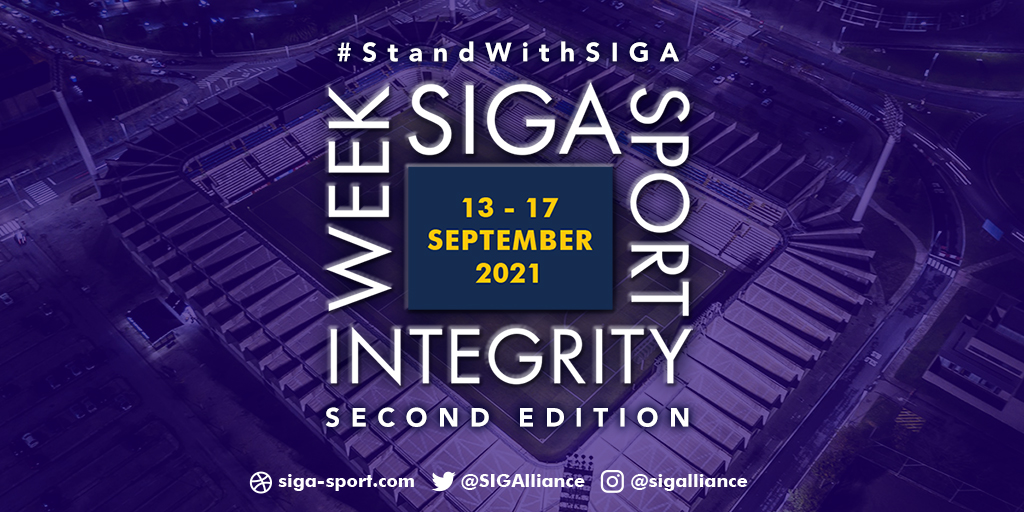Day two of the Sport Integrity Week 2021 (14th September) on Financial Integrity, Transparency and Sustainability In Sport reunited high-level panellists and top Keynote speakers. Today we share Stage Africa, two keynotes and two webinars. Welcome to the second part of day 2 re-run.
Don’t miss the chance to watch on-demand.
Stage Africa
(Watch here)
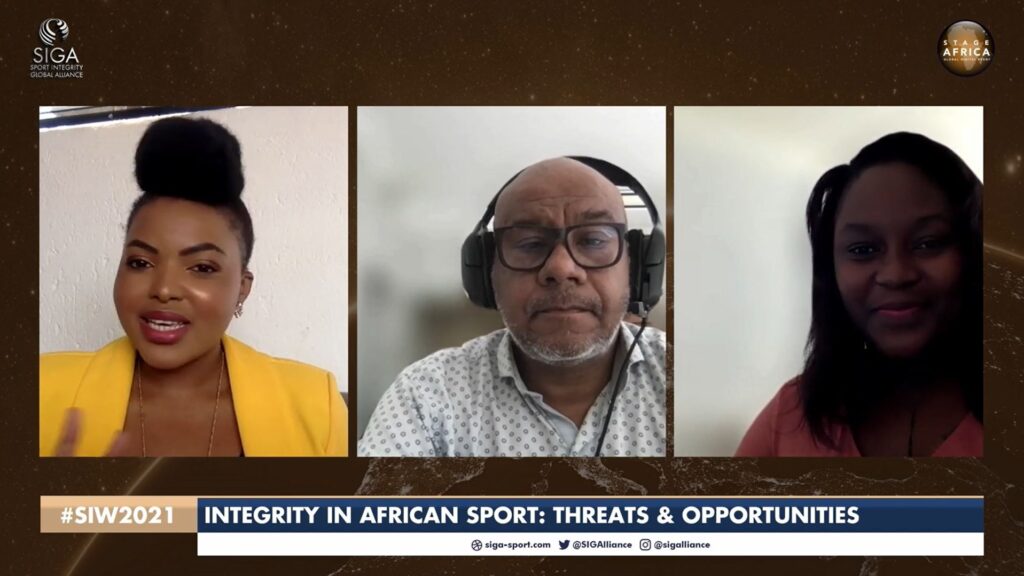
Uganda’s football star Jean Sseninde, member of CAF Women’s Football Committee, and CEO of Sseninde Foundation expressed her views on problems that threaten Sport Integrity in Africa:
“There are some issues of governance in Africa, and you can see that by how many leaders have been picked up for corruption, mainly in the football federations. There have been quite a few… One key thing often ignored is sexual harassment. Women have to fight. Sometimes you have to do certain things you don’t want to do, and they force you to do this. Such cases are not reported because in Africa that is the norm. Women are supposed to keep quiet. I always say if I am a leader, let me treat women and men the same way, because if you invest the right resources and show them how to do things, you will get the same results from both men and women”.
Keynote – Grégoire Polad
(Watch here)
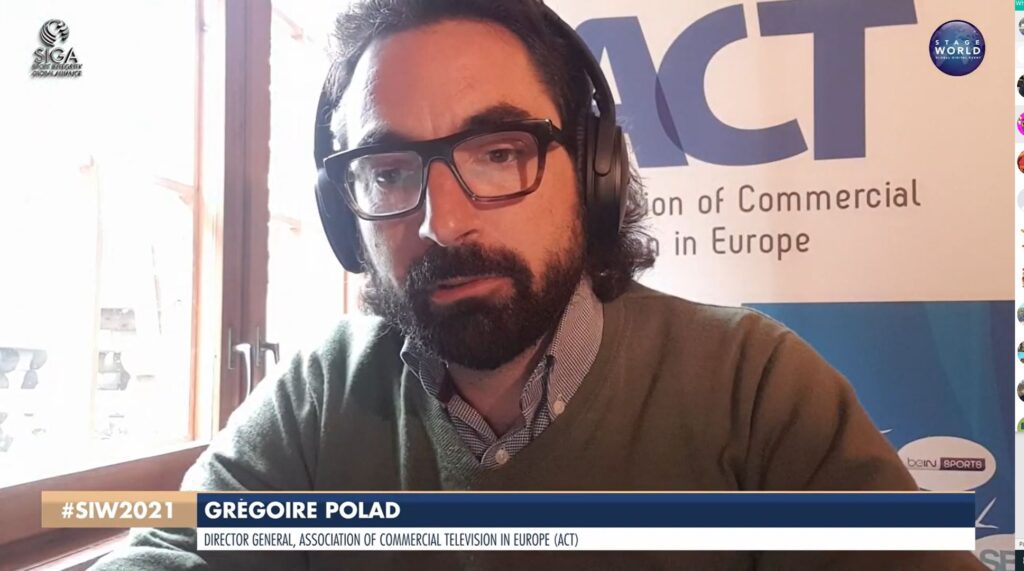
Grégoir Polad, Director General, Association of Commercial Television in Europe (ACT) keynote launched the panel on Digital Piracy and IP Protection In Sport. If technical tools exist to tackle the illegal broadcast of live sport events, the rights holders now claim for strong action of the European Union governments:
“Sport-related sectors represent close to 3 per cent of European employment and more 2 per cent of European GDP. Live sports events play an undeniable role in our collective identities and social cohesion. Although the digital environment’s development had made it easier for all fans to access live broadcast of events, it has facilitated online piracy. This threatens the sustainability of the sports sector, as well as the financial stability of broadcasters. We now have the technical tools to identify illegal broadcast with high levels of accuracy. The legal tools, however, remain a work in progress. Currently, the law is fragmented across the European Union.”
Webinar: Fight For Your Rights: Digital Piracy and IP Protection In Sport
(Watch here)
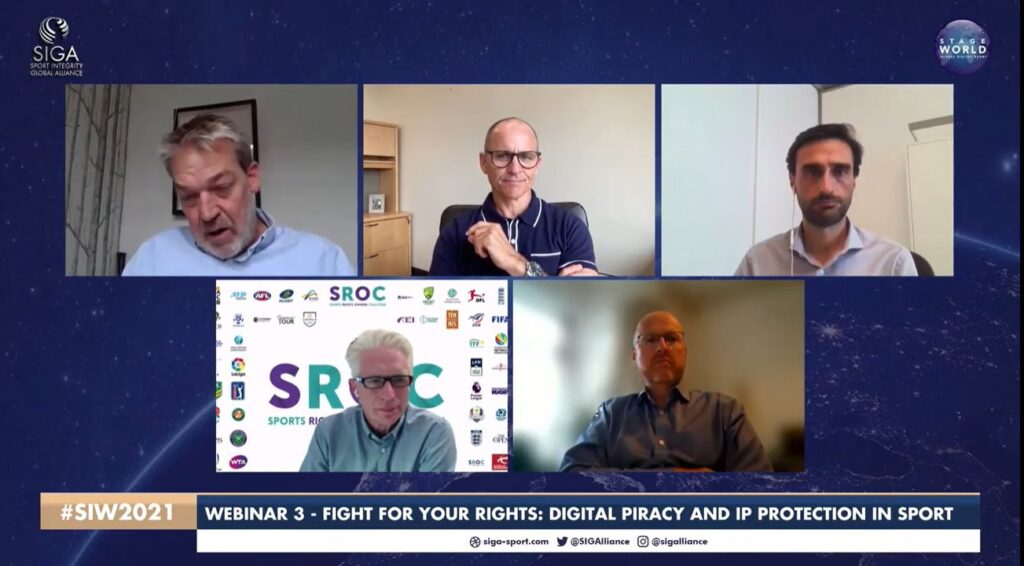
Sport needs income streams that sustain its activity and ensure its long-term development. The commercialisation of sports content, in particular, audiovisual rights is the main income stream and the key pillar upon which the development model of the whole sporting industry has been based over the past three decades. Regrettably, this development model remains under threat, a victim of persistent lack of legal protection at a national and international level. This panel examined this vital problem and asked the hard questions. What are the real magnitude and ramifications of this illegal practice? How widespread is the problem? What needs to be done? Tune in to find out how the battle against piracy can be won to preserve the rule of law, the integrity of sport and its long-term sustainability and further development.
Simon Brydon, Senior Director, Security Business Development – Sports at Synamedia was the moderator. He revealed “piracy costs USD 28 billion to sport”, while the rights revenue bill is “50 billion”.
Cameron Andrews, Legal Director for Anti-Piracy, beIN Media Group:
“The sport rights relies on selling exclusive contents into a territory, and pirates just make it available everywhere, without paying for it. Piracy is a major threat to the global broadcast industry. And this happens all across the globe. Many internet providers allow those illegal streams to operate in Europe, so European regulation could potentially provide solutions. Also technology like blocking is important…”
Diego Dabrio, Senior Audiovisual Anti-Piracy Expert, UEFA
“Piracy is ever-changing, constantly evolving. 15 years ago, you needed a laptop, it was annoying with popups… Technology gave ready-to-use platforms, so it is fair to say pirates always find a way at the end of the day. We have smartphones, smart tvs, etc. I believe technology will enable us to tackle piracy, also. The source of pirate content is mainly the same illegal streams on different platforms.”
Marc Riccio, CEO, USA Lacrosse
“This issue of owning the rights or the direct relationship with the consumer is important. The more contact you have, the better you can provide value to that relationship. With piracy you lose access to that relationship. That’s certainly a problem for all challenger sports who need to understand what their consumer wants.”
Mark Lichtenhein, Chairman , Sports Rights Owners Coalition (SROC)
“There is some good news on the pipeline. The European institutions for the first time recognise the problem. There was a resolution passed by the European Parliament in May recomending the European Comission measures on the challenges of the sports event organisers on the digital event. That’s the first step. We are on track to actually see some measures put in place”.
Keynote – Jon Duncan
(Watch here)
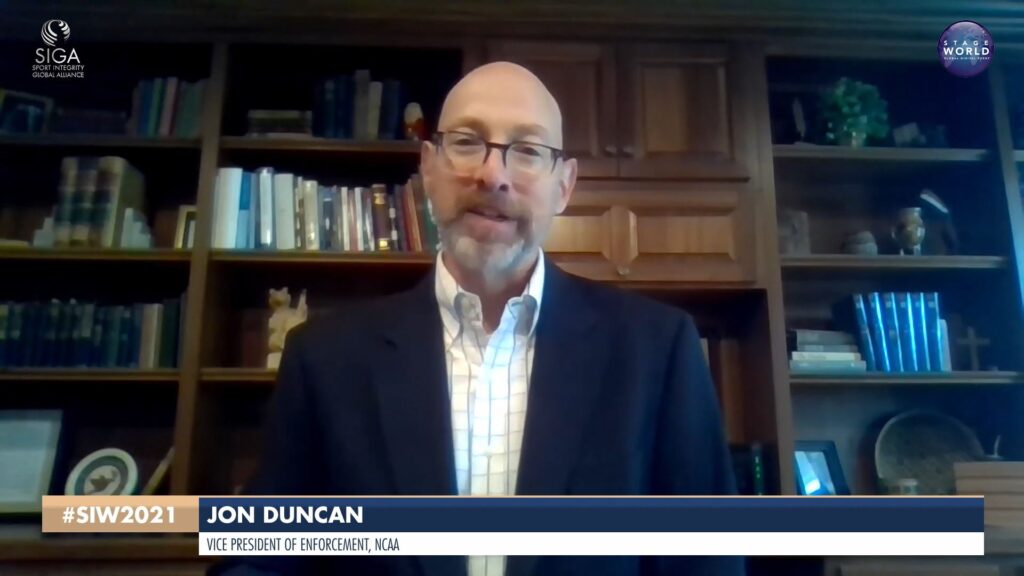
Jon Duncan, Vice president of enforcement, NCAA, enthusiastically emphasised the changes university Sport is facing. However, he reminded that law enforcement is also crucial:
“Allowing student athletes and NCAA member schools to be compensated for ther name, their image is a major policy shift for NCAA and became effective in July 2021. However, there are significant legal challenges to work on the long term”.
Stage America: Collegiate Sport
(Watch here)
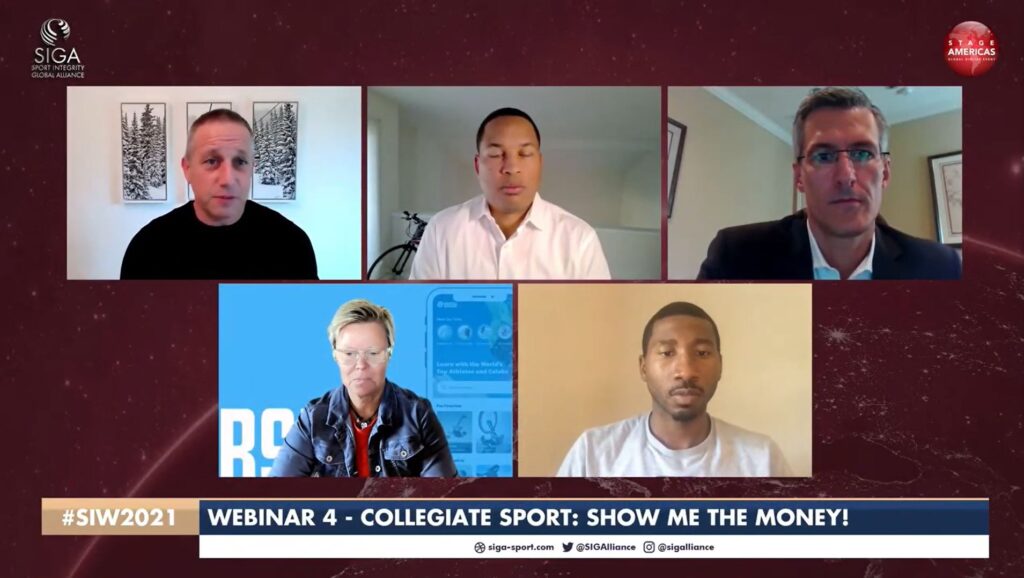
US Collegiate Sport is big business. The revenues of the highest profile College sports teams exceed that of the English Premier League. It is, therefore, no surprise that the athletes want a share. This topic has been raising integrity issues around the concept of student/athlete and fairness and equality for decades – complex themes that lie at the heart of collegiate sport. However, we are now at the precipice of a new normal as we address the fallout from the recent NCAA policy that allows student-athletes to monetise their name, image and likeness (NIL) from July 1st 2021. This panel explored the ramifications of this paradigm shift, the associated risks of corruption and the integrity consequences of this ruling for all US sports.
Under Bill Carter’s moderation, four high-level speakers gave their insights on such a pressing issue.
Courtney Brunious, COO, Altius Sports Partners
“One of the things that keep me awake at night is the fact that the laws are fragmented in the US, depending on each state.
Richard Borghesi, Professor, University of South Florida
“What if a revenue-sharing agreement was in place between athletes and universities? If they were to share revenues 50/50 what it would look like? The top collegiate basketball would 800 thousand USD a year… The NCAA puts a cap on the compensation players can earn, which seems very unfair. This cap really affects black athletes. The football and basketball revenues are generated mainly by black players, usually, finance other sports.”
Tracy Benson, CEO / Cofounder, Obsesh Sports Marketplace
“For 125 years, the NCAA owned every athlete’s names. Finally, athletes own their names and can hold their own names and image, turning them into a commercial value. I want to make sure that D3 athletes know they have an opportunity. We are excited to be here, and we believe there is no better time for them to be entrepreneurs.“
Raymon Gaddis, Marketing and Public Relations Intern, Philadelphia Union | Former MLS Athlete
“Trying to navigate this new space for athletes creates unfamiliar territories that haven’t been explored. Athletes being taxed is a problem. How are our students going to deal with it?”
– END –
ABOUT SIGA
SIGA is the world´s largest coalition in the field of sport´s governance and integrity. Supported by more than 100 international multi-industry supporters, SIGA is an independent and neutral organisation whose mission is to bring about meaningful reforms and enhance the integrity of all sports through a set of universal standards operated by an independent and neutral body. SIGA is the only organisation to bring together sport, governments, academia, international organisations, sponsors, business, rights holders, NGOs and professional services companies, from every region in the world, around a common cause of fostering greater integrity throughout sport. Click on the hyperlinks for the list of SIGA Members and Committed Supporters and SIGA Partners.
For more information on SIGA, including its vision, mission and reform agenda, please refer to the website: www.siga-sport.com. To contact SIGA, please email: comms@siga-sport.com.
Find SIGA on Twitter at https://twitter.com/SIGAlliance,
Instagram at https://www.instagram.com/sigalliance/?hl=en
LinkedIn at https://www.linkedin.com/company/sigalliance/.

